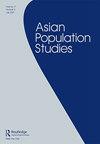The effect of delaying school start time on adolescents’ time use and health: evidence from a policy change in South Korea
IF 1.5
4区 社会学
Q2 DEMOGRAPHY
引用次数: 0
Abstract
ABSTRACT This paper examines how delaying school start time to 9 o’clock affected the time use and health of secondary-school students in South Korea. To identify the causal effects of delaying school start time, we used a difference-in-differences methodology with two nationally representative datasets to take advantage of a unique natural experiment in South Korea. We found that the policy led students to sleep 16.1 min more on weekdays and 7.6 min less a day over the weekend, increasing sleep satisfaction among the affected students. Furthermore, the policy contributed to increased growth and improved mental health. However, the effects of the policy were not uniform across subgroups. In terms of time use, students from the highest socioeconomic group increased their sleep duration most. In contrast, students from the middle and lowest socioeconomic categories increased their use of electronic devices and decreased their study time compared to students from the highest socioeconomic group. We provide evidence that these behavioural differences by socioeconomic group could be related to the degree of parental monitoring and available economic resources.推迟开学时间对青少年时间使用和健康的影响:来自韩国政策变化的证据
摘要:本研究旨在探讨韩国中学生将上学时间推迟至9点对时间利用和健康的影响。为了确定延迟上学时间的因果影响,我们利用韩国独特的自然实验,对两个具有全国代表性的数据集使用了差异中的差异方法。我们发现,该政策使学生在工作日每天多睡16.1分钟,周末每天少睡7.6分钟,提高了受影响学生的睡眠满意度。此外,该政策促进了经济增长和改善了心理健康。然而,该政策的效果在各个亚组之间并不一致。在时间使用方面,来自社会经济地位最高群体的学生增加睡眠时间最多。相比之下,与社会经济地位最高的学生相比,社会经济地位中、最低的学生增加了电子设备的使用,减少了学习时间。我们提供的证据表明,社会经济群体的这些行为差异可能与父母监控的程度和可用的经济资源有关。
本文章由计算机程序翻译,如有差异,请以英文原文为准。
求助全文
约1分钟内获得全文
求助全文
来源期刊

Asian Population Studies
DEMOGRAPHY-
CiteScore
3.30
自引率
14.30%
发文量
12
期刊介绍:
The first international population journal to focus exclusively on population issues in Asia, Asian Population Studies publishes original research on matters related to population in this large, complex and rapidly changing region, and welcomes substantive empirical analyses, theoretical works, applied research, and contributions to methodology.
 求助内容:
求助内容: 应助结果提醒方式:
应助结果提醒方式:


